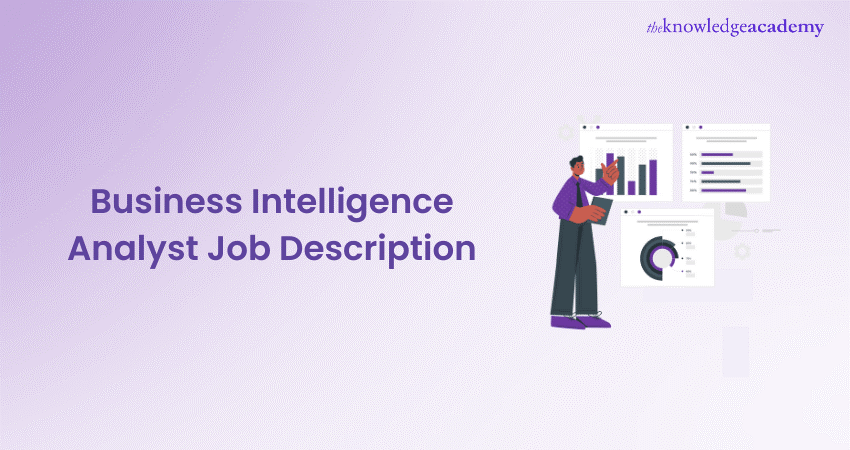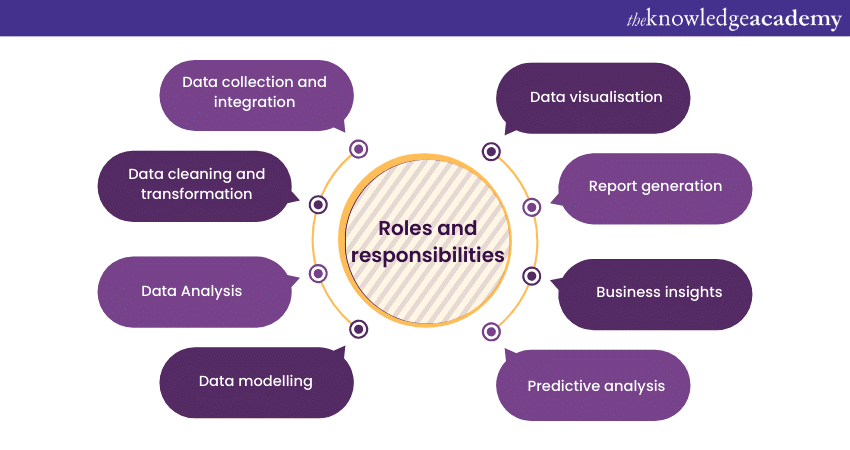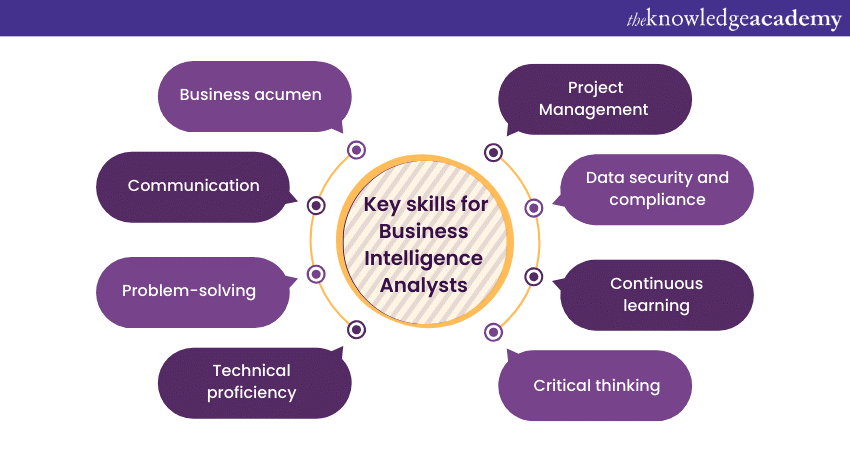We may not have the course you’re looking for. If you enquire or give us a call on +1 6474932992 and speak to our training experts, we may still be able to help with your training requirements.
Training Outcomes Within Your Budget!
We ensure quality, budget-alignment, and timely delivery by our expert instructors.

Have you ever thought about what it's like to be a Business Intelligence Analyst? Curious about what they do and how to succeed in this field? This blog on the Business Intelligence Analyst Job Description will help you clear all these doubts.
This blog discusses the Business Intelligence Analyst Job Description, roles and responsibilities, career, key skills, etc. Read more to gain a better understanding.
Table of Contents
1) Who is a Business Intelligence Analyst?
2) How to Become a Business Intelligence Analyst
3) Business Intelligence Analyst roles and responsibilities
4) Key skills for Business Intelligence Analysts
5) Business Intelligence Analyst salary range
6) Job Description templates for aspiring Business Analysts
7) Conclusion
Who is a Business Intelligence Analyst?
A Business Intelligence Analyst is a professional responsible for collecting, analysing, and interpreting data to provide valuable insights and support strategic decision-making within an organisation. They play a crucial role in helping businesses understand their data, identify trends, and use this information to make informed choices that can lead to improved performance and competitiveness.
Unlock the power of data with our Business Intelligence & Reporting course for a brighter career in analytics

How to become a Business Intelligence Analyst?
Becoming a Business Intelligence Analyst involves a combination of education, skills development, and practical experience. Discussed below are some of the key steps to help you begin a career in this field:
a) Educational foundation: Begin by obtaining a relevant bachelor's degree in fields such as Computer Science, Information Technology, Business, or Statistics. A solid educational background forms the basis of your career.
b) Learn Data Analysis tools: Gain proficiency in data analysis tools and software, such as Microsoft Excel, SQL, and data visualisation tools like Tableau, Power BI, or QlikView. These tools are essential for data manipulation and reporting.
c) Understand business concepts: Develop a good understanding of business concepts, including finance, marketing, and operations. Business acumen is crucial for interpreting data in a business context.
d) Statistical and analytical skills: Learn statistical and analytical techniques to analyse data effectively. Courses in statistics and data analytics can be immensely helpful.
e) Certifications: Consider pursuing certifications in relevant areas, such as Certified Business Intelligence Professional (CBIP), which can enhance your credentials and marketability.
f) Gain experience: Seek internships or entry-level positions in data-related roles to gain hands-on experience. This practical exposure is invaluable for building your skills.
g) Data visualisation: Master the art of data visualisation. Develop the ability to create clear and engaging visualisations to present data in a meaningful way.
h) Problem-solving skills: Hone your problem-solving skills, as you will often need to identify and address data-related challenges and anomalies.
i) Communication skills: Work on your communication skills to convey complex data findings to non-technical stakeholders in a clear and understandable manner.
j) Networking and continuous learning: Network with professionals in the field through events, forums, and online communities. Stay updated on industry trends and emerging technologies and be open to continuous learning and skill improvement.
Use your expertise to fuel competitive strategies. Become our next Competitive Intelligence Analyst—apply now and make an impact!
Business Intelligence Analyst roles and responsibilities
Discussed below are some of the most important roles and responsibilities of Business Intelligence Analyst.

Data collection and integration
Gathering data involves pulling information from diverse sources like databases, spreadsheets, and external APIs, ensuring a comprehensive dataset. Integrating data is the process of merging and consolidating this information into a unified format. It promotes data accuracy and reliability for analysis.
Data cleaning and transformation
Data cleansing entails removing inconsistencies, errors, and duplications from datasets, ensuring the data is of high quality. Transforming data into a consistent format involves standardising and structuring it for meaningful analysis.
Data Analysis
Data analysis encompasses using statistical and analytical techniques to explore datasets, uncovering patterns, trends, correlations, and anomalies that provide valuable insights. These insights are crucial for informed decision-making and improving business processes.
Ace your next interview! Prepare with these top Competitive Intelligence interview questions.
Data modelling
Creating data models involves designing structures that optimise data storage and retrieval, such as data cubes, star schemas, or snowflakes. These models enhance data organisation and accessibility, supporting effective analysis and reporting.
Data visualisation
Data visualisation is the art of transforming data into interactive dashboards, reports, and visual representations using tools like Tableau, Power BI, or QlikView. This makes complex data accessible and understandable for stakeholders and aids in data-driven decision-making.
Unlock the power of data with the latest Business Intelligence platforms. Find the right solution for your business!
Report generation
Regular report generation involves creating documents that present key performance indicators (KPIs) and other relevant metrics, allowing stakeholders to monitor business health. Customising reports to specific departmental needs ensure that the right information reaches the right audience.
Business insights
Translating data findings into actionable insights means extracting meaning from data that informs strategic decisions, identifies areas for improvement, and uncovers opportunities for revenue growth. Business insights are the driving force behind data-driven decision-making in an organisation.
Predictive analysis
Predictive analysis employs modelling and forecasting techniques to anticipate future trends and outcomes, helping organisations plan and adapt proactively. Utilising predictions to inform strategies is a fundamental part of maximising the value of data.
Master the competitive landscape! Learn the step-by-step Competitive Intelligence process to stay ahead.
Ad-hoc analysis
The ad-hoc analysis addresses specific and often unplanned business questions or challenges by rapidly exploring data to provide timely insights. This type of analysis is invaluable for responding to immediate and critical decisions.
Cross-functional collaboration
Collaborating across departments, including marketing, finance, and operations, enables understanding of their unique data needs and ensures that data-driven solutions are tailored to each area.
Acting as a liaison between the data team and other business units fosters efficient communication and alignment, ensuring that data efforts support the organisation's overall goals.
Unlock your data-driven potential with our Business Objects Reporting Course and shape your business intelligence career. Join today!
Key skills for Business Intelligence Analysts
Key skills for Business Intelligence Analysts include:

Business acumen
Business acumen for a Business Intelligence Analyst means understanding not only data but also the broader context of the organisation's goals and strategies. It involves aligning data analysis efforts with these objectives to ensure that the insights derived contribute meaningfully to the business's success.
Communication
Effective communication is a vital skill for Business Intelligence Analysts as they need to translate complex data findings into clear and understandable messages for non-technical stakeholders. This skill facilitates collaboration and ensures that data-driven insights can guide decision-makers in the organisation.
Discover the top tools for effective Competitive Intelligence. Enhance your strategic decision-making!
Problem-solving
Problem-solving skills in a BI Analyst are essential for identifying and addressing data-related issues and challenges. Whether it's data quality problems, anomalies, or obstacles in the data analysis process, these skills help in finding effective solutions to maintain data accuracy and integrity.
Technical proficiency
Technical proficiency involves being well-versed in the use of BI tools like Tableau, Power BI, or QlikView for data visualisation and analysis, as well as having a strong command of Microsoft Excel for data manipulation. This proficiency is essential for effective data analysis and reporting.
Project Management
Project management skills are necessary for overseeing BI projects, including defining project objectives, setting timelines, and establishing clear deliverables. This ensures that data analysis initiatives are well-structured, on track, and meet business goals.
Stay ahead of the competition! Learn what Competitive Intelligence is and why it's crucial for business success.
Data security and compliance
Understanding data security and compliance standards is crucial for a BI Analyst to protect the integrity and confidentiality of data. It involves ensuring that data handling practices adhere to legal and industry-specific regulations.
Continuous learning
Continuous learning is vital in the fast-evolving field of Business Intelligence. BI Analysts must stay updated on industry trends and emerging technologies to remain effective in their roles and harness the full potential of new tools and techniques in data analysis.
Critical thinking
Critical thinking is a fundamental skill for a Business Intelligence Analyst. It involves the capacity to evaluate data and information with a discerning and analytical mindset. This skill enables BI Analysts to not only comprehend the data they are working with but also to assess its relevance, accuracy, and potential implications.
Uncover how Business Intelligence can transform your data into actionable insights. Learn more now!
Business Intelligence Analyst salary range
According to Glassdoor, the average salary for a business intelligence analyst in the United Kingdom is £49,361 per year, as of October 25, 2023. However, salaries can vary depending on a number of factors, including experience, location, and industry.
Entry-level business intelligence analysts can expect to earn around £32,670 per year, while experienced professionals can earn up to £55,000 per year. Salaries are also typically higher in London and other major cities.
Here are some of the highest-paying industries for business intelligence analysts in the United Kingdom:
|
Industry |
Salary range |
|
Financial services |
£45,000-£55,000 |
|
Technology |
£40,000-£50,000 |
|
Consulting |
£43,000-£53,000 |
|
Healthcare |
£42,000-£52,000 |
|
Retail |
£41,000-£51,000 |
Here is a table of the average salary range for business intelligence analysts in the United Kingdom, by experience
|
Experience |
Salary range |
|
Entry-level (0-2 years) |
£32,670-£38,000 |
|
Mid-level (3-5 years) |
£40,000-£45,000 |
|
Senior (5+ years) |
£45,000-£55,000 |
Job Description templates for aspiring Business Intelligence Analysts
Some examples of Business Intelligence Analyst jobs are given below:
Job Description Template 1: Entry-Level Business Intelligence Analyst
Position: Business Intelligence Analyst (Entry-Level)
Location: [Location]
Job Type: Full-time
About Us:
[Company Name] is a dynamic and forward-thinking [industry/sector] company that values the power of data-driven decision-making. We are seeking an Entry-Level Business Intelligence Analyst to join our team and embark on an exciting journey into the world of data analysis
Responsibilities
Collaborate with senior analysts to collect and analyse data from various sources.
Assist in creating data visualisations, dashboards, and reports.
Contribute to data cleaning and transformation activities.
Learn and apply statistical and analytical techniques to gain insights from data.
Communicate data findings and insights to the team effectively.
Qualifications
Bachelor's degree in Computer Science, Business, or a related field.
Strong analytical and problem-solving skills.
Basic knowledge of data analysis tools and software.
Effective communication and a strong desire to learn.
Job Description Template 2: Junior Business Intelligence Analyst
Position: Junior Business Intelligence Analyst
Location: [Location]
Job Type: Full-time
About Us
[Company Name] is a leading player in the [industry/sector], leveraging data to drive business success. We are looking for a Junior Business Intelligence Analyst who is enthusiastic, analytical, and ready to make a significant impact on our data-driven initiatives.
Responsibilities
Work with data from various sources to support data analysis efforts.
Create basic data visualisations and assist in report generation.
Collaborate with the team to ensure data accuracy and quality.
Learn and apply statistical analysis techniques to draw meaningful insights.
Contribute to improving data processes and procedures.
Qualifications
Bachelor's degree in a relevant field.
Some experience in data analysis or related roles.
Familiarity with data analysis tools and software.
Strong analytical and problem-solving skills.
Excellent communication and teamwork capabilities.
Please customise these templates as needed to align with the specific requirements and qualifications expected from Business Intelligence Analyst candidates in your organisation.
Curious about a Business Intelligence Analyst’s earning potential? Check out the latest salary trends in your area!
Conclusion
Understanding the Business Intelligence Analyst Job Description is vital in grasping the significance of this role in the contemporary world. Business Intelligence Analysis is all about transforming data into actionable insights to drive strategic decisions. It's a dynamic and rewarding career, emphasising data structure, adaptability, and effective communication.
Unlock the power of data with our courses on Business Intelligence and Reporting to boost your career. Join today!
Frequently Asked Questions
Upcoming Office Applications Resources Batches & Dates
Date
 Querying Data with Microsoft Transact-SQL DP080
Querying Data with Microsoft Transact-SQL DP080
Thu 1st Jan 1970







 Top Rated Course
Top Rated Course


 If you wish to make any changes to your course, please
If you wish to make any changes to your course, please


